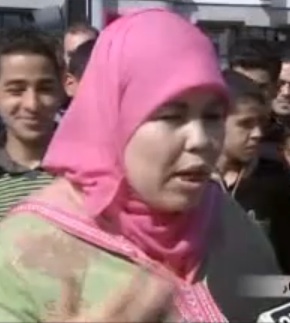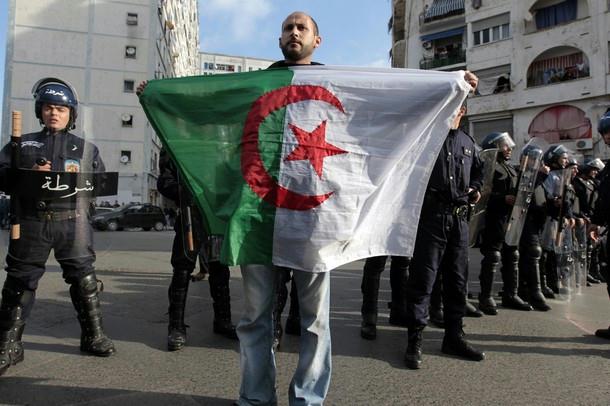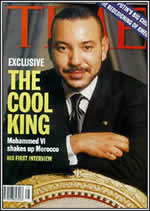Morocco’s opposition youth movement is calling on followers to boycott a constitutional referendum on July 1st. On Twitter, @ibnkafka, a Moroccan source, confirmed the data and mamsawtinch.com presents the petition against the referendum proposed by King Mohammed VI.
Claiming that the reforms proposed by the King in the referendum program are largely superficial, the February 20th Movement invokes freedom and real changes.
WL Central will be updating news on Morocco, with new items added at the top. You can contact me on Twitter @kgosztola or by email at kgosztola@hotmail.com.
Current time in Rabat, Morocco:
MONDAY, February 20
 10:45 PM Photo screen shot of 2M TV report
10:45 PM Photo screen shot of 2M TV report
The King's Speech: He announces the installation of an Economic and Social Council to "give strong impetus" to "dynamic reforms." He says "we have consistently refused to succumb to the demagoguery." And he outlines:
Our ultimate goal is to ensure conditions for a dignified life for all Moroccans, especially the most needy, and implement a comprehensive development to create productive jobs, especially to the youth that we place in the heart of our development policy.
Police arrest activists. Video posted less than hour ago.
Moroccan news segment on the February 20 movement
Afrol News points out that Morocco's peaceful protests didn't end peacefully. The violence is described:
 (update below)
(update below)
Algerians that participated in a “Day of Rage” on February 12 continue to come out and protest. The news site Bikya Masr reports “Algerians pledge to continue to demonstrate until President Abdelaziz Bouteflika has been removed from power.” The protesters inspired by Egypt intend to begin to engage in sit-ins that can hopefully bring the country to the brink like Egyptians brought their country to the brink and forced President Hosni Mubarak from power.
Demonstrators chant, “Bouteflika out,” but not all of them. Some just want democratic reforms. Those demonstrating have mostly been Islamists or pro-democracy activists.
They talk about the fear being gone after what unfolded in Egypt and Tunisia.
 A February 20 protest has been planned to restore "the dignity of the Moroccan people and for democratic and constitutional reform and the dissolution of parliament." One of Morocco’s leading Islamist movements, Justice and Charity, which has an estimated 200,000 members and is banned from politics but tolerated, has called for “urgent democratic change.” It’s website states “It is unjust that the country’s riches should be monopolised by a minority.”
A February 20 protest has been planned to restore "the dignity of the Moroccan people and for democratic and constitutional reform and the dissolution of parliament." One of Morocco’s leading Islamist movements, Justice and Charity, which has an estimated 200,000 members and is banned from politics but tolerated, has called for “urgent democratic change.” It’s website states “It is unjust that the country’s riches should be monopolised by a minority.”
Abdesslam Yassine, leader of Justice and Charity does not challenge the monarchy itself, but refuses to recognise Mohammed’s religious title of Commander of the Faithful. He was put under house arrest for several years under King Hassan, but King Mohammed VI lifted the restriction shortly after coming to power in 1999. Morocco is a constitutional monarchy with an elected parliament, but the constitution allows the king to dissolve the legislature, impose a state of emergency and have a key say on the appointment of sensitive government portfolios, including the prime minister. Justice and Charity would like to replace the constitution with "a democratic one to mark a break with all aspects of autocracy ... and monopolisation of authority and national wealth and preserves the human dignity of the Moroccan citizen". “It’s an Islamism that is anti-establishment that is pushing for peaceful change,” said Islam expert Mohamed Darif of Justice and Charity. “It doesn’t talk about abolishing the monarchy.”
US state cable 2010-02-24: 10DOHA71 outlines Senator Kerry's meeting with Qatar's Prime Minister, Hamad bin Jassim Al Thani (HBJ) on February 13, 2010. In the meeting, HBJ stresses that it is a mistake to exclude Hamas from Israeli-Palestinian negotiations, equates Egypt to a physician with one patient, and accuses Egypt of having a vested interest in dragging out the talks for as long as possible. He also warned against a US military action against Iran.
HBJ told Senator John Kerry February 13 that "everyone in the region" seems to have a separate plan for moving ahead on the Israeli-Palestinian dispute when only one plan was needed; a plan that both the Israelis and Palestinians would accept and finalize. HBJ underscored that it is a mistake to ignore Hamas in seeking a lasting agreement. Saying this does not mean that Qatar expresses a preference for Hamas, but the Palestinian Authority (PA) cannot sign off on an agreement on behalf of the Palestinians where open divisions exist.
Theme by Danetsoft and Danang Probo Sayekti inspired by Maksimer